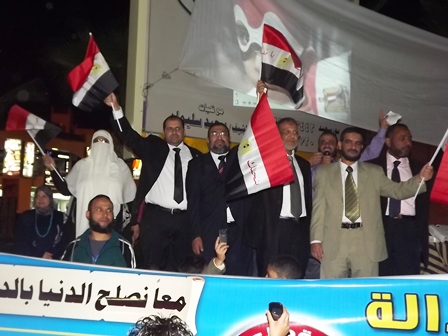

This Mediterranean city is poised to host an electoral battle between Islamists and secularists that is emblematic in many ways of what is happening throughout Egypt. Although there are thirteen electoral lists competing for the four proportional representation seats allocated to Port Said, the same few came up over and over again in conversations with activists and domestic civil society observers. On the Islamist side of the spectrum, the Freedom and Justice Party (FJP, Brotherhood) and Nour Party (Salafi) are the contenders. The Wasat Party (moderate Islamist) also has made a positive impression. Among the non-Islamists, the Wafd has a long history here but its reputation has been tarnished by decades of political deals with Mubarak and his predecessors. The Free Egyptians (liberal) also reportedly have gained popularity. Several observers predicted that no party would sweep the district but that four out of these five would get the seats, perhaps two Islamist and two secularist—which might be more wishful thinking than hard analysis.
Some aspects of the campaigns in Port Said over the last few weeks are appealing and innovative, while others are troubling. Parties have done the usual distribution of pamphlets and posters, but some (particularly Nour) have been more creative—for example, setting up kiosks in many of Port Said’s seven neighborhoods in which a volunteer with a laptop will help a puzzled voter locate his or her correct polling station and get a quick lesson in how to vote. FJP reportedly has done a great deal of door-to-door campaigning, always bringing male and female volunteers to provide separate briefings for family members according to sex.
The uglier aspect of the campaigns—use of sectarianism—also is unfortunately emblematic of a larger issue in Egypt. The FJP and Nour have made extensive use of mosques as campaign platforms, and imams reportedly have used Friday sermons to warn that voting for a non-Muslim or even a non-Islamist is sinful. Christians reportedly have been instructed in churches to vote for the Free Egyptians, while Nour reportedly has gone around town tearing down that party’s posters.
But the real danger of sectarian confrontation here surrounds one of the two individual seats rather than the proportional seats. George Ishak, the Christian founder of the Kifaya movement and an avowed secularist, is in hot competition with Muslim Brother Akram al-Shaer. Each apparently has a significant phalanx of youth supporters who have been facing off at campaign events, and local observers fear the competition could turn violent and openly sectarian if the two candidates go to a runoff.
Young people are active in Port Said, as elsewhere in Egypt, and I heard from those I met today much frustration. Ahmad, a young local activist who was limping painfully from two bullets he carries in one leg from last week’s clashes in Tahrir, said mournfully of the contest to begin tomorrow: “These are not the elections we fought for, but it is my duty to go and serve as a domestic monitor in the hope that someday we can make the process better.” He worried that the FJP was creating an image of Islamist invincibility by exaggerating the size of electoral gains in Tunisia and Morocco, and complained bitterly that the liberal parties were hurting their chances of capturing the youth vote by running “all old people.” (In truth, by the look of the campaign photos there are few if any candidates under 40). Ahmad said that some of his fellow activists would boycott the elections due to continued military rule, and that others who go to vote will wear black as a silent protest in solidarity with “the martyrs of Tahrir.”
Another question is whether ex-National Democratic Party candidates will gain any seats. Ibrahim Darwish, a former military officer running for the Shura Council within the newly-established “National Party” (al-Hizb al-Qawmi), thought that his fellow citizens would make their choices primarily based on the reputations of the specific candidates on each list. His party had carefully chosen physicians, teachers, and civil servants with a record of public service, and he was proud that his was the only list to place a woman second. Offering a view contrary to that of most other observers, Darwish said Islamists had turned off the public by overspending on campaigns, leaving the typically-independent Port Saidis with a feeling that they were being bought. “Most voters are still undecided,” he concluded.
In fact, many things are still undecided about these elections, apparently including how ballot boxes will be secured overnight on Monday—a major source of concern for parties and civil society groups, who fear that thugs will overcome security officers to get access. Today I heard at least three different plans for what will happen: boxes will be sealed and secured in place, or they will be gathered into a central room in each polling station, or all will be gathered into one central place in the district and then redelivered the next morning. One rumor I heard today is that the FJP is so worried about its votes being discarded on Monday night that it has instructed its base to turn out on Tuesday only.
Image: 912aaaaaaDSCF1159.jpg

